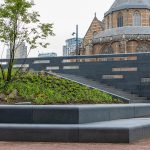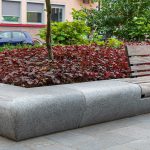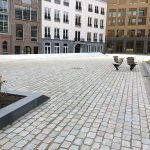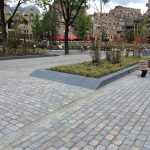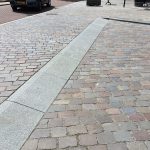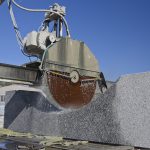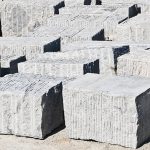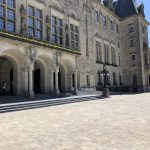Corporate responsibility
J. Visser Klinkers & Kasseien B.V. considers it very important that the extraction and processing of natural stone takes place in a sustainable manner. We purchase directly from factories with which we have long-term relations. These factories do business with quarries that we know well and visit regularly. In general, the working conditions are of a high standard and a great deal of attention is paid to safety and environmental aspects.
Code of conduct
J. Visser Klinkers & Kasseien B.V. applies a Code of Conduct in its procurement process. Through this document we commit ourselves and our suppliers to adhere to a number of important legal, ethical, environmental and social standards and values.
Initiative TruStone
J. Visser Klinkers & Kasseien B.V. is affiliated with the TruStone Initiative. TruStone is based on the principles of the United Nations on Business and Human Rights, the Guidelines for Multinational Enterprises of the Organization for Economic Co-operation and Development (OECD) and the fundamental labour standards of the International Labour Organization (ILO).

As a participant in the TruStone Initiative, we apply a so-called due diligence process. This means that we systematically investigate whether we ourselves, directly or throughout our chain of suppliers, are related to damage caused to people, animals, nature and/or the environment. This not only concerns actual damage, but also the risk that damage may occur. If we find that we are involved in damage, or the risk thereof, we take measures against it.
Our actual contribution to improvements in the supply chain
We purchase natural stone from a number of European countries, China and India. We have not had any production in Vietnam recently and we are phasing out our existing stock.
From our own observation we know that the risks are very limited in European countries. These countries have also not been designated as high-risk countries by the TruStone Initiative.
We know from a risk analysis by TruStone that there are risks in China. For example, there is no freedom to form a union and employees sometimes work a lot of overtime. We discuss these topics with our suppliers. The TruStone Initiative also offers importers a training to discuss these topics with suppliers. We participate in this training so that we can support our supplier’s management even better in starting a dialogue with its employees about wages and working hours.
The TruStone risk analysis also show that there are serious risks in the region of India where we source both hand-cut and machine sawn products. With hand-cut materials, risks such as forced labour and child labour can occur. With machine sawn materials for example there may be safety risks for workers.
We purchase the hand-cut materials through an importer in Belgium, who actively participates in the TruStone stakeholder dialogue in Rajasthan in which importers, suppliers and local organizations work together on improvements (https://www.imvoconvenanten.nl/nl/natuursteen/initiatief/projecten). The machine sawn materials come from a supplier with a modern factory, which we visited ourselves. Together with that supplier, we will also participate in aforementioned dialogue next year.
Environment
J. Visser Klinkers & Kasseien B.V. opts for environmentally friendly solutions where possible in its business operations. A few examples:
Water: We use rainwater for our production process, which we then recycle.
Electricity: We recently invested in the most economical compressors, which also work with heat recovery. J. Visser Klinkers & Kasseien B.V. only consumes green electricity.
Solar panels: Our building is equipped with solar panels, so that we can work electricity-neutral and self-sufficient.
Gas: Our new building meets the highest insulation requirements, which significantly reduces gas consumption.
Fuel: When purchasing vehicles, emissions and fuel consumption are always decisive factors for us.
Paper consumption: Due to investments in new software, incoming and outgoing paper flows are kept to a minimum.
Material consumption: Through ‘nesting software’, we can further reduce our amount of material waste.
Waste: We completely separate our ceramic waste from granite and composite, resulting in a pure waste stream. Our waste can therefore, for example, be reused for the construction of roads.
